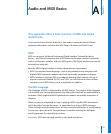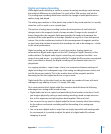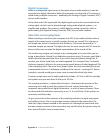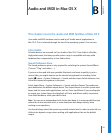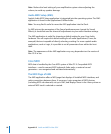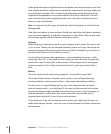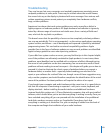
81
C
Appendix
C Optimizing Your Computer Audio
System
Logic is known for its stable and reliable operation. You can
further enhance your system performance by optimizing your
computer configuration for music applications.
Outside of music, a well-configured and well-maintained computer performs more
reliably, with fewer crashes, and that’s got to be a good thing! The following pages
feature tips and tricks that may help you to optimize your computer configuration. A
first-aid kit—for computer emergencies—is found at the end of the chapter.
Hardware
Obviously, the fastest Mac you can afford will be the most appropriate computer for
use with Logic. If you can stretch to a multi-processor Macintosh, do so. Logic, and
Mac OS X itself, is built to make use of multi-processor Macs.
In general, you should avoid “weighing down” your computer system with unnecessary
components, so don’t add a SCSI card if you can make do with FireWire or internal
drives.
You should concentrate much of your effort on the selection of the “right” audio
hardware, to ensure that it is compatible with your software and other computer
hardware components.
Memory
An adequate amount of RAM is important for the overall stability of your computer
music system. At least one gigabyte (or more!) of high-quality RAM is recommended,
particularly when working with numerous audio tracks or software samplers.
Hard Drive
If your “day-to-day” work involves a large number of audio tracks, consider using a
separate, fast hard drive with enough storage capacity for your audio files. FireWire is a
good choice for these sorts of duties.





